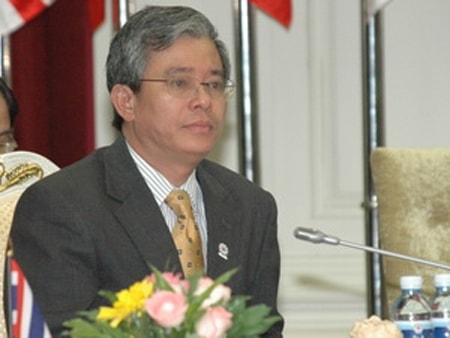ASEAN, China, Japan and South Korea Foreign Ministers' Meeting
On July 10, 2012, the 13th ASEAN+3 Foreign Ministers' Meeting (with three countries: China, Japan and South Korea), the 5th Mekong-Japan Foreign Ministers' Meeting and the 2nd Mekong-South Korea Foreign Ministers' Meeting took place in Phnom Penh, Cambodia.
On July 10, 2012, the 13th ASEAN+3 Foreign Ministers' Meeting (with three countries: China, Japan and South Korea), the 5th Mekong-Japan Foreign Ministers' Meeting and the 2nd Mekong-South Korea Foreign Ministers' Meeting took place in Phnom Penh, Cambodia.
Deputy Foreign Minister Pham Quang Vinh attends the ASEAN +3 Foreign Ministers' Meeting
Authorized by Foreign Minister Pham Binh Minh, Deputy Foreign Minister Pham Quang Vinh led the Vietnamese delegation to attend the Conferences.
At the ASEAN+3 Foreign Ministers' Meeting, the Ministers highly appreciated the important results in ASEAN+3 cooperation in all fields; they said that the ASEAN+3 process has developed in both breadth and depth, and is currently one of the most dynamic and effective cooperation mechanisms in promoting cooperation and connectivity in East Asia.
The Ministers agreed that countries need to continue to focus resources to effectively implement the Joint Declaration on East Asia Cooperation and the ASEAN+3 Work Plan for the period 2007-2017; welcomed the decision of the ASEAN+3 Finance Ministers to increase the budget for the implementation of the Chiang Mai Initiative Multilateralization Agreement from 120 billion USD to 240 billion USD; proposed to soon implement the ASEAN+3 Emergency Rice Reserve Fund Agreement signed in October 2011; at the same time, further promote cooperation in trade, investment, tourism, transport, infrastructure development, agriculture, food and energy security, environment, climate change, natural disasters, infectious diseases... and have support measures to ensure the correct implementation of the roadmap of trade agreements between ASEAN and each country: China, Japan and South Korea.
To celebrate the 15th anniversary of the establishment of the ASEAN+3 process, the Ministers agreed on a plan to organize many cultural, tourism and people-to-people exchange activities in 2012.
At the ASEAN+3 Foreign Ministers' Meeting, Deputy Minister Pham Quang Vinh highly appreciated the substantive progress in ASEAN+3 relations and the active participation and important contributions of China, Japan and South Korea to the cooperation process.
In the coming time, ASEAN+3 countries need to continue promoting deeper cooperation on financial and monetary issues, including effectively implementing the Chiang Mai Initiative Multilateralization Agreement, encouraging the private sector to participate in the Asian Bond Market Initiative; enhancing connectivity, trade, investment, infrastructure and transport development, human resource development...
In this process, countries need to promote their role and take advantage of the East Asia Research Centers Network and the East Asia Vision Group II. The Deputy Minister also asked Partners to continue supporting ASEAN in building the Community, linking and connecting the region, narrowing the development gap... as well as supporting ASEAN's central role in regional frameworks and forums such as ASEAN+1, ASEAN+3, EAS, ARF, ADMM+...
The Mekong-Japan Ministerial Meeting reviewed the implementation status and discussed the direction of future cooperation activities. Based on the decision of the Leaders at the 4th Mekong-Japan Summit (Tokyo, April 2012), the Meeting adopted the "Mekong-Japan Action Plan to Implement the Tokyo Strategy 2012".
The conference also welcomed the establishment of a Deputy Foreign Minister-level meeting mechanism by Vietnam, Laos and Thailand to resolve difficulties and promote the development of the East-West Economic Corridor (EWEC), and acknowledged the recommendations made at the first meeting of this mechanism (in Quang Tri, May 2012).
The Mekong-Korea Foreign Ministers' Meeting reviewed the cooperation situation based on the Han River Declaration adopted at the First Mekong-Korea Foreign Ministers' Meeting (October 2011).
Regarding immediate cooperation, the Conference agreed to: (i) implement a number of pilot projects in six priority areas (including infrastructure, information technology, green growth, water resource development, agriculture and rural development, and human resource development); (ii) organize the "Mekong-Korea Business Forum" in 2013; and (iii) select 2014 as the "Mekong-Korea Exchange Year". For medium and long-term cooperation, the parties agreed to develop a Mekong-Korea Action Plan for approval at the 2014 Ministerial Conference.
In addition to reviewing and orienting cooperation, the Conferences also discussed regional and international issues of common concern as well as emerging challenges such as food security, disaster management, maritime security and safety in North Korea, reform of the Security Council, etc.
During the discussion, many countries expressed deep concern about recent developments in the East Sea regarding peace, stability, maritime security and safety in the region, especially the complicated developments that harm the exclusive economic zones and continental shelves of coastal countries, affirming that all countries must respect international law and the 1982 United Nations Convention on the Law of the Sea (UNCLOS).
Deputy Minister Pham Quang Vinh expressed concern about the recent complicated developments in the East Sea, reaffirming the Vietnamese Government's stance against China's approval of the establishment of "Sansha City" as well as the invitation to bid for 09 oil and gas blocks located entirely within Vietnam's exclusive economic zone and continental shelf, seriously violating the sovereignty and jurisdiction of coastal states over their exclusive economic zones and continental shelves as prescribed by the 1982 United Nations Convention on the Law of the Sea and contrary to the spirit of the DOC, causing harm to peace, stability, security and maritime safety in the region. The Deputy Minister re-emphasized the principles of respecting the sovereignty and jurisdiction of coastal states over their exclusive economic zones and continental shelves as prescribed by the 1982 United Nations Convention on the Law of the Sea, resolving disputes by peaceful means, not using force, respecting international law, especially the 1982 United Nations Convention on the Law of the Sea, and the spirit of the DOC.
According to (Chinhphu.vn)-LT






